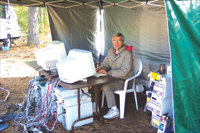Kuala Lumpur to go wireless

Kuala Lumpur will go wireless by the end of this year. The Kuala Lumpur City Hall (DBKL) has publicly announced that by end of 2008, about 1,500 Free WiFi zones will be created to cater ro the needs of the community at large. As of now, around 250 WiFi zones are available in selected areas of Kuala Lumpur City. Interested residence of the city can register via wireless to get their account activated. The service is based on WiMAX 2.3 Giga Hertz and runs at 512 kbps. The WiFi service is free till 2010. The city-wide project involves the Kuala Lumpur City Hall, Malaysian Communication and Multimedia Commission (MCMC), Synapse Technologies Sdn Bhd and Packet One Networks (M) Sdn Bhd. The first phase of the project aims to make the city wireless with the collaboration of Packet One Networks, while the second part is to have the city’s own portal www.kul.com.my managed by Synapse Technologies.

Biometric passports to replace e-Passports in France
France is all set to introduce RFID (Radio Frequency Identification) enabled biometric passports. This is an attempt of the French government to make national security conditions more stable. The new RFID enabled passport documents can be read from several feet away. These biometric passports will contain a digital photo of the bearer’s face and eight fingerprints. The fingerprints of children under six years old will not be required.

The French government informed that the dates for the implementation of the new system in metropolitan France, French overseas departments and territories and for the citizens living abroad have not been determined due to regulatory issues. The passports will be made available from Autumn 2008 and will be issued with a ten-year validity period. Introduction of biometric passports will eventually replace e-Passports.
e-Education to help Greece bridge digital divide Ministry of Education and Religious
Affairs of the Hellenic Republic (Greece) has decided to include ICT tools in education. Is is an an effort of the government to enhance digital literacy, strengthen ICT infrastructure and support development of digital content and educational software in the country. The Ministry of Education and Religious Affairs has chalked out a plan to support and install network and computational equipment, besides developing software and digital content for educational institutes and training the educational community on ICTs.
Under this initiative, the Ministry would modernise the administration set up and incorporate ICT in the teaching process as well. The country is looking at further consolidating its efforts towards bridging the digital divide through three additional projects – ‘Get Digital’, ‘Portable Computer for every Student’ and ‘Blog out’. The three new projects have been proposed jointly by the Ministry of Economy and Finance and the Ministry of Education and Religious Affairs. The main objective of the projects is to promote broadband Internet and incorporate new technologies as part of the syllabus at various levels of secondary and tertiary education.
Survey: ICTs revolutionising healthcare in Europe
With e-Health applications playing a significant role in doctor’s practices in Europe, about 80 percent of European Union (EU) general practitioners increasingly store and send patients’ data like lab reports, diagnostic reports, prescriptions etc. electronically.
According to a pan-European survey by European Commission on electronic services in healthcare, 87 percent of European doctors use a computer, of which 48 percent have a broadband connection. The commission is planning to make recommendations on cross-border interoperability of electronic health record systems. Besides, it is also planning to launch, in several countries, a project on cross-border e-Health services for patients travelling within the EU. The survey found that there is lack of training and technical support as major barriers posing for doctors not using ICT. In order to spread e-Health, the doctors (who are willing to share clinical information) under the survey, asked for more ICT intervention in medical education, increased training and better electronic networking among healthcare practitioners.
NigComSat to provide Internet facilities in 400 communities
NIGCOMSAT (Nigerian Communication Satellite) Limited, a company under the Federal Ministry of Science Technology, Nigeria, announced that the company will provide Internet facilities to over 400 Community Tele-Centres (CTC) nationwide. The project is meant to provide Internet access (at affordable rates), multimedia and Voice over Internet Protocol (VoIP) in remote and underserved urban areas. NIGCOMSAT’s project is designed to provide value-added service such as e-Learning centres for distant learning students, e-Health care delivery, wireless access to homes, repair centre and space education. NIGCOMSAT is trying to enter into strategic partnerships with pioneering organisations such as Linkserve Limited and Sub-Urban Telecoms to ensure cost-effective and high quality service delivery.
Be a part of Elets Collaborative Initiatives. Join Us for Upcoming Events and explore business opportunities. Like us on Facebook , connect with us on LinkedIn and follow us on Twitter, Instagram.











